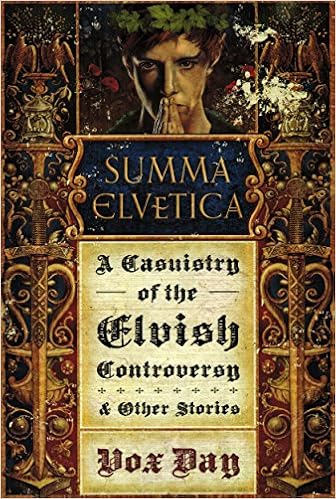I’ve been wanting to get this collection of all the Selenoth short stories along with the first little novel together in ebook form since Marcher Lord published the hardcover, but I never quite managed to get around to it. But things have been going so swimmingly with regards to getting 4GW Handbook out the door – it’s pretty much good to go now, although we’ll spend the weekend going over it to see if we can clean up any more lurking typos – that I was able to spare a few hours over the last two evenings to add the additional six stories to the original Summa Elvetica, “Birth of an Order”, and “Master of Cats”. So if you want all the stories in one place, or if you haven’t read any of them, you can do so now in Summa Elvetica: A Casuistry of the Elvish Controversy & Other Stories. It’s also available via Kindle Unlimited, which makes this the obvious starting point for those thinking about dipping a toe into Selenoth.
Granted, dropping the neophyte reader into Latin pseudo-Aquinas with chapters headings such as IA Q. VII A. I ARG. I is probably not what the marketing experts would recommend, but if that sort of thing doesn’t at least make an epic fantasy reader curious, he should probably stick with Robert Jordan and Terry Brooks anyhow.
One of these days we’ll get it out in hardcover too one of these days. I have to say, of all the books in my library, the hardcover that Marcher Lord put out right before it was bought has the prettiest and most spiking spine of them all. Kirk did a great job of making it match the ARTS OF DARK AND LIGHT covers while also setting it apart.
 We also had a little Kindle Select confusion which temporarily resulted in our removing of both QUANTUM MORTIS A Man Disrupted and QUANTUM MORTIS Gravity Kills from Amazon, but the matter was quickly resolved and both books are now up and available conventionally as well as through Kindle Unlimited.
We also had a little Kindle Select confusion which temporarily resulted in our removing of both QUANTUM MORTIS A Man Disrupted and QUANTUM MORTIS Gravity Kills from Amazon, but the matter was quickly resolved and both books are now up and available conventionally as well as through Kindle Unlimited.
It’s been so long since we bothered making any use of Smashwords that I simply forgot the books were up there. It’s really remarkable how completely Amazon has steamrolled the opposition. You would think that the Big Five publishers would have teamed up with Barnes & Noble to set up an online alternative by now, but they are too frightened to take the hit to their sales that collectively pulling their books from Amazon would entail. That’s why they will glide gracefully into literary history, in total denial all the while.
We’re under no illusions that it couldn’t happen to smaller independent publishers too, but we’re protected by declining marginal utility. Amazon can take all of the business away any time it wants, but why bother when it can simply take one-third the revenue for none of the effort involved beyond providing the infrastructure?





